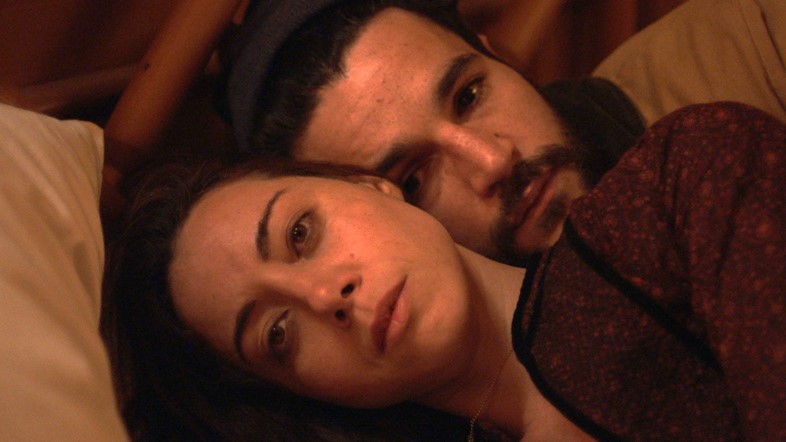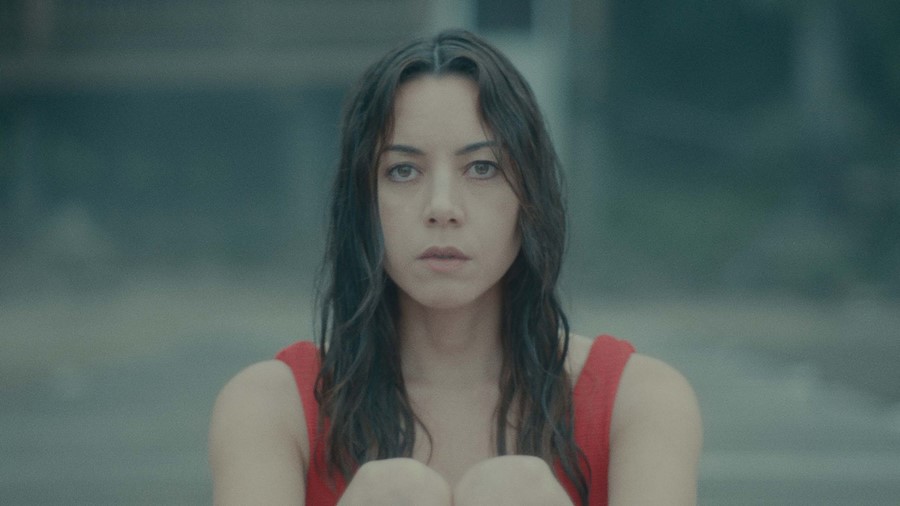As her new film Black Bear is released, the American actor and Parks and Recreation star reflects on her love for independent film, her journey into the industry and working with her husband, Jeff Baena
Like all the best love stories, Aubrey Plaza’s relationship with independent film began in high school, when she was working part-time at her local video store. “My aunt was one of the managers and there was a little monitor that we would play random movies on,” she tells AnOther, ahead of the release of her new film Black Bear. “I would walk down an aisle picking random independent films and just throw them on. I never looked back.” From Christopher Guest’s Waiting for Guffman to John Waters’ Serial Mom, Plaza imbibed the wave of golden age independent cinema that swept America during the 90s – and it shows.
Independent projects have held a special place for Plaza ever since, as anyone who watched her opening monologues at the last two Film Independent Spirit Awards can attest. Put simply, the American actress and comic thrives on the kind of off-kilter beat only independents can provide. From The Little Hours (directed by her husband, Jeff Baena) to Ingrid Goes West (which Plaza both starred in and produced), the genre leaves enough room for Plaza to deliver her signature poker-faced humour that everyone first fell in love with in NBC’s Parks and Recreation. In Black Bear – a dreamlike metanarrative on the creative cul-de-sacs of filmmaking, directed by Michael Lawrence Levine – Plaza is fed enough rope to run free and explore uncharted territory, delivering a career-best performance along the way.
Acting is just one of several strings to Plaza’s bow however. From directing to producing, lighting and editing, she is in this business for the long ride – guts and all, from beginning to end. This enthusiasm for all aspects of the industry owes much to her time at New York’s Upstanding Citizens Brigade Theatre, a hugely influential bastion of the city’s comedy scene. After moving to New York in her late teens, the theatre’s philosophy around improvisation is something Plaza has carried with her ever since. “The long-form improv they teach is all about supporting your scene partner, collaborating with other people and being really present,” she says. “It’s about trying to get to the truth of the matter because the funniest stuff comes from what’s most true.” The UCB is also where Plaza first discovered the genius of Amy Poehler, a co-founder of the theatre and already a hero of Plaza’s by the time the two met on the set of Parks and Rec. “She doesn’t get caught up in the fake Hollywood stuff,” says Plaza of her co-star. “She just does her thing and is always the funniest person in the room.”

Like Poehler, who was married to fellow actor and comedian Will Arnett before parting ways in 2016, Plaza mixes the personal and the professional through her various projects with her husband Jeff Baena. It’s something she shares with Black Bear director Levine, who frequently collaborates with his wife, the actor and director Sophia Takal. Having worked together on the set of Netflix’s comedy series Easy (cast as husband and wife, no less), Plaza and Levine bonded over the pitfalls of working with their spouse. “I think it was just something we both really related to, but I had no idea he was writing a script. So when he called to say, ‘I wrote this and thought of you to be in it and produce,’ I had no idea what to expect. Then I read it and was initially terrified by the prospect of doing it, but also just blown away by how nuanced the characters were.”
Levine’s film unfolds in two parts. In the first we meet Alisson (Plaza), a successful director seeking inspiration at a remote lake house where she is hosted by a young couple: Gabe (Christopher Abbott) and Blair (Sarah Gadon). A three-way tension immediately becomes apparent – fuelled by plenty of red wine, an uncomfortable evening boils over in tragedy. Act II sees a shift in the power balance. Now Alisson is an actress married to Gabe, who is directing her in his new film alongside Blair. Gabe feigns an affair with Blair to coax the ultimate performance from Alisson, who takes the bait and hits the bottle, delivering a wild performance that blurs any distinction between reality and performance.
“Just the idea of playing a character that is playing a character was instantly exciting for me,” says Plaza, who considered the opportunity as, “one of those actor challenges”. “Many people have tried to do it and done it well,” she continues, “I mean Leonardo DiCaprio in Once Upon A Time ... In Hollywood – that whole sequence when he’s acting and going to his trailer and freaking out. I watched that over and over – so good.” As for its message on husband-wife partnerships, Black Bear should be enough to put anyone off. As Plaza notes: “It’s like you can hurt that person the most and you can help that person the most. It’s just fraught with complexity.”
Nowhere is this complexity more keenly felt than at the film’s visceral climax, in which Alisson, on the verge of a nervous breakdown with whisky bottle in-hand, gives Gabe and Blair both barrels in a paranoid descent befitting of the film’s underlying darkness. In style and substance, this frenzied denouement is reminiscent of Gena Rowlands, the Hollywood actress and wife of legendary indie auteur John Cassavetes. Their notoriously explosive relationship, virtually indiscernible from their electric on-screen dynamic, was responsible for the raw authenticity that set their work apart. In Woman Under the Influence, the pair’s crowning achievement directed by Cassavetes and starring Rowlands, Cassavetes’ famously manipulative treatment of his wife during production yielded, in her own words, a career-best performance. Treating breakthrough and breakdown as two sides of the same coin is just one thread in Black Bear’s wider meditations on the fraught and slippery business of creative process. Plaza is well aware of the dangers, but like anyone truly wedded to their craft, has long accepted them. “If I’m going to expose myself and surrender myself to this process,” she says, “I hope I come out alive … and I hope the camera is rolling.”
Black Bear is out now.
